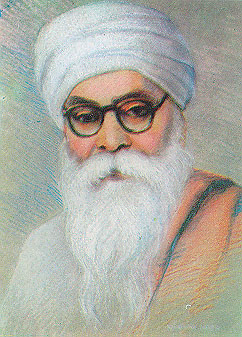ISHVAR, from Sanskrit Isvara (isa = ruler, master, lord + vara = environing, enclosing, i.e., the all-pervasive Lord), is one of the several names used in Indian philosophy for God, the Ultimate Reality, also known as Brahman. There is, however, a subtle conceptual difference between Isvara and Brahman as interpreted by Shankaracharya, the philosopher of Vedanta. Brahman, he holds, is the Ultimate Reality or Pure Consciousness, devoid of all attributes (nirguna) and all categories of the intellect (nirvishesha), while Isvara is the personal aspect of the impersonal Brahman. Isvara is Apara Brahman or Lower Brahman as compared to the Absolute, which is called Para Brahma or Higher Brahman. Isvara is the phenomenal aspect of the Transcendent Brahman who is Infinite, beyond the reach of finite thought, and who can only be described in negative terms such as ineffable, indescribable, acosmic, timeless, etc. All normal talk about God is, therefore, about Isvara. Even positive attributes such as transcendent, self-existent, perfect, etc., really refer to “conditioned Isvara” rather than to the “unconditioned Brahman.”
In brief, Isvara is God as related to the phenomenal reality—the personal aspect of the impersonal Reality. He is the Lord of Maya, the Creator, Sustainer, and Destroyer, immanent throughout His creation. In Sanskrit, isa and isvara are also defined as names of the Hindu gods Shiva, Kubera, and one of the Rudras, and even as “names of the goddess Durga or any other of the Saktis or female energies of the deities.” In the Guru Granth Sahib, the Sikh Scripture, is, isar, or isuru, the Punjabi forms of Skt. Isvara, appear sparingly for Shiva as well as for God (GG, 2, 6, 316, 516, 923, 925, 1082); isur once stands for great men in general (GG, 816); and isaru once appears as the name of a person other than Shiva (GG, 952).
The composite term paramesar (Skt. paramesvara = parama, supreme, highest + Isvara) for God appears more often; once it is spelled even as paramesvar (GG, 299). Sikhism does recognize the traditional categories of transcendent and immanent, as also of nirguna (without attributes) and saguna (with attributes, sarguna in Punjabi), pertaining to God, but not the Shankaraite distinction between higher and lower Brahman. The emphasis here is on the unicity of Ultimate Reality, the “Ik Onkar.”
The term Parbrahma (Shankara’s Para Brahman) appears frequently in the Sikh Scripture, but Aparbrahma or Apara Brahman never does. For the Sikhs, the same Absolute is both nirguna and sarguna (GG, 98, 128, 250, 287, 290, 862). The nirguna Brahman manifests himself as sarguna Brahman, in relation to His attributes.
References:
- Nirbhai Singh, Philosophy of Sikhism. Delhi, 1990
- Sher Singh, The Philosophy of Sikhism. Lahore, 1947
- Ishar Singh, The Philosophy of Guru Nanak. Delhi, 1969
The Concept of Ishvar in Sikhism
Introduction
The concept of Ishvar (a term often used in Indian spiritual traditions to refer to God) holds a nuanced and profound interpretation within Sikhism. Sikh philosophy focuses on the oneness and universality of the Divine, transcending specific names or forms. While Ishvar might traditionally refer to a personal deity in some Indic traditions, in Sikhism, the concept of God—referred to as Waheguru, Akal Purakh, or Ik Onkar—represents an all-encompassing, formless, timeless, and singular supreme reality.
God as Ik Onkar: The One Universal Creator
In Sikhism, Ik Onkar, meaning “One Universal Creator,” is the central tenet of the faith. This phrase begins the Mool Mantar, the foundational verse of the Guru Granth Sahib. Sikhism emphasizes that God is not confined to anthropomorphic qualities or personal attributes, as the term Ishvar might suggest in other contexts. Instead, God is infinite, genderless, omnipresent, and beyond human comprehension.
As Guru Nanak Dev Ji proclaimed:
“There is one Creator of all creation. Truth is its name. Eternal is its being. Timeless is its existence.”
The emphasis is on unity and transcendence rather than specific names, including Ishvar.
Rejection of Anthropomorphism
Unlike some Indic traditions where Ishvar may be depicted in personal or human-like forms, Sikhism strongly rejects anthropomorphic representations of God. The Gurus described God as Nirankar (formless), Nirgun (without attributes), and Akal (beyond time). This contrasts with the more personal and relatable deity that Ishvar might represent in traditions such as Vedanta or Yoga.
God’s Immanence and Transcendence
While Sikhism emphasizes God’s transcendence, it also recognizes God’s immanence. Waheguru is both beyond creation and present within it. The term Ishvar—in its broader Indic sense—aligns with this dual nature of divinity. However, Sikh teachings stress that God’s presence is not limited to particular spaces, forms, or beings. Everything in creation reflects the divine essence, and divinity can be experienced through meditation on Naam (the divine name) and living in accordance with Hukam (divine order).
Equality and Universality of God
Another distinguishing feature of Sikhism is its emphasis on the universality of God. In the Sikh tradition, God is not restricted to any one group, caste, or faith. The inclusive teachings of the Gurus extend beyond the traditional understanding of Ishvar, advocating that all of humanity can realize the divine through devotion, humility, and righteous living.
As Guru Granth Sahib explains:
“The same light shines within all; through His creation, the Creator is revealed.”
Conclusion
In Sikhism, the concept of Ishvar is subsumed under the broader and more universal understanding of Waheguru or Ik Onkar. Sikh teachings emphasize God’s oneness, formlessness, and transcendence, while also highlighting His immanence in all creation. Although terms like Ishvar may hold relevance in the broader Indic context, Sikh philosophy offers a distinctive and unparalleled vision of the Divine as the eternal, infinite, and all-pervading Creator, accessible to everyone through devotion, meditation, and righteous action.






